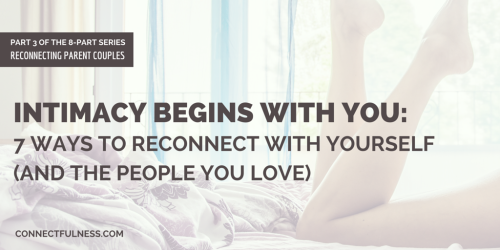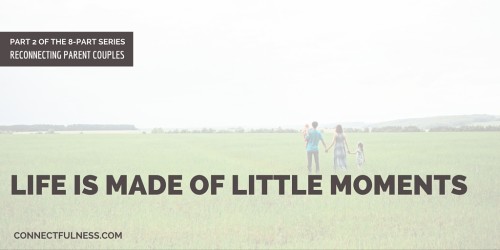A note on the Reconnecting Parent Couples Series: These eight posts present perspectives and advice from respected colleagues and experts from across the world. I’ll also weave in my personal and professional discoveries and introduce you to aspects of my evolving relationship practice: Connectfulness.
>> PART 5 | WHAT IS PLAY? <<
When you’re deeply engaged in doing something you love, you experience a sense of flow and ease. You get lost in the moment and time feels fluid. You aren’t sure if things are moving faster or slower; you just simply loose track of time all together.
When I am in that state of flow with another person I tend to find myself feeling really groovy about our connection. And when that someone is my husband, well, that takes me back to where it all began.
My husband and I met on a rock climbing day trip with mutual friends. We slowly developed our relationship through lots of playtime. Rock climbing and snowboarding trips were our jam and it was on these trips that our interest in one another was piqued.
Now that we’ve been together for more than a decade, we still need to play. In fact, we probably need it even more. Because without play, all we have left is the busy work, the messy moments, and the juggling act of our daily life. We need play as individuals and we need playtime together as a couple.
Play is Relationship Glue
When your relationship is out of balance, when you feel unsafe, or when you struggle to be vulnerable with your partner, you probably feel less playful.
And, when play is denied over the long term, your mood darkens. You get depressed, irritable, your attempts to connect with the people you love may become more of a struggle, or worse, you stop trying to connect all together.
Play helps you find your way to security. When you feel more secure in your relationships, you have the strength to evolve in all aspects of your life.
You could say there’s a fascinating “chicken or the egg” scenario at work here. When you feel safe, you’re more available to play. The more you play, the easier it is to deepen intimacy.
When did play come more easily to you?
Remember when you were dating? Remember how it felt to simply be together in the days before you became parents?
It's hard to play and get back to those 'when we first met' moments. In fact, 70% of parenting couples report a decline in relationship satisfaction after the birth of their first child. Why is that? Here’s my hypothesis:
As a society, we take parenting too seriously. (We also take “adulting” too seriously. And childhood too for that matter).
You want to be the best parent you can be. You are biologically driven to tune into your child. You’re conditioned to put your own needs, and the needs of your partner on the back burner. And in doing so, you lose track of what it means to play and be playful.
“The defining factor among couples who were able to find romance again, and even to find new fields of emotional intimacy previously unexplored, was that they were able to find ways to play together. Those who played together, stayed together. Those who didn’t either split or, worse yet, simply endured an unhappy and dysfunctional relationship.
What has become clear to me now is how play can become the cornerstone of all personal relationships, from everyday interactions to long-term love. In fact, I would claim that sustained emotional intimacy is impossible without play.”
Stuart Brown, MD, founder of the National Institute for Play
You evolve - or do not - through the success of your relationships
When relationships are playful, it feels safer to pause, lean in, and regroup when things feel rough. In playful relationships, it feels a whole heck of a lot easier to lead with curiosity rather than defensiveness.
In the post, What is Play? we discussed how your relationship can be reshaped by simply playing with your attitude. Recent findings show that play actually creates new neural connections that are essential to the way information gets organized in your brain. During play, ideas and actions can be formed and tested safely because your survival is not at stake (I'm so grateful to Dr. Stuart Brown and his book, Play, for giving us these concepts).
It can be hard to imagine what that means. Do you remember the game RedRover, RedRover from grade school?
A brief review: it begins with two teams of equal size, each team holding hands, facing one another in two lines. One team starts by calling over a member of the other team “Red Rover, Red Rover, let __ come over!”
The team member who gets called out makes a rush for the other team’s line attempting to break through their linked hands. If he doesn’t break through, he joins their team, if he does, he selects one of their team member to join his team. Each team continues to call someone over until all the players are on the winning team.
This is play. Play is what happens when everyday rules are exchanged for a new set of rules that guide your interaction. But play is about more than switching up the rules. The profound shift takes place in each participant’s mindset.
Play is what happens when you sit down with Jenga, a game of cards, Red Rover, a crossword puzzle, or whatever it is that connects you to your flow. Ultimately, however, play is about how you approach situations, not the activity you’re engaged in.
Boost your pleasure, enjoyment & connection
Throughout your life, play helps to sculpt your brain and helps you enter into relationships more fully and freely. These playful relationships offer you a safe haven of security and can be a launching pad that enables you to go out and explore the world.
In play, it’s easier to stay connected and keep your attention on the people and things that matter most.
This makes sense when you think about your own children and what they need to learn and grow, right? You are wired in just the same way they are. Play, after all, has a purpose, it’s about connection and growth. Being willing to play is about being able to connect and fail together.
Sometimes it’s hard to play, it’s hard to be vulnerable. And that’s exactly when we need to really slow things down.
Slow down
Moments that challenge you to move out of your comfort zone also allow you to pause and learn something about how far you can go, what it means to regroup, and how you and the people you care about can carry on.
In play, it’s safe to fail and try again. This is the nature of play, experimentation and exploration. You don’t have to get it all right all the time, you just need to be willing to keep trying.
Play can become a safe space to pay attention to and test how safe you feel in your relationship. Where else do you have this kind of access to see what does and doesn’t work and adapt accordingly?
While it can be challenging, healthy play stretches you to grow and mature. By its very nature this growth will be uncomfortable. That’s often where couples get caught up - in the discomfort. To truly grow, and to grow together as a couple, you need to get comfortable in the uncomfortable. You need to challenge your partner and let them challenge you - playfully. .This the the stuff that makes for passion and desire. This is the stuff that pushes you outside your comfort zone, just so enough that you don’t stagnant. This is the powerful, beautiful part of pushing boundaries.
How to Rediscover Play
In small, slow doses, try playing with your awareness of how you tune into and sense connection between you and your partner (you can also try this with your kids and other loved ones, but I find that when partners deepen and develop these skills together it transforms everything in the family’s life).
Let’s start by playing with a simple meditation. Take a few breaths,in and out.
Focus on the direction of your breath. Pay attention to the sensation of your breath. Keep your awareness on your breathing. You can probably keep your attention on the direction of your breath for three breaths. But the longer you keep at it, somewhere between 3 breaths and 300, you’ll likely lose focus. Your mind will wander.
Every time your mind wanders, it’s a new opportunity for you to bring your awareness back to your breath. This is where the practice of meditation is honed; in the noticing of when your attention has strayed and in flexing the awareness muscle to come back. Every time you do this, your brain gets better at doing it again. You develop new pathways in your brain. That re-attention to your breath, if you do it gently, without criticism: that’s play.
Your relationship needs a similar sort of framework and mindset for play too. The willingness to notice and to bring your awareness and attention into coming back into balance and cultivating that safe, playful space. This is the Connectfulness Practice that is at the heart of what I offer my client and my community.
Over time, you’ll be able to observe how you stay connected and develop an awareness of where your disconnects occur. Eventually, when you notice these connections and disconnections, you’ll be able to practice pulling yourselves back into balance - and back into your relationship.
You can begin to develop your own Connectfulness Practice. Make it a game of relationship mindfulness in which you both explore your expectations and boundaries. Notice how you feel, deepen your awareness of your partner and practice the art of helping each other feel more secure and connected.
Have I inspired you to delve a teensy bit deeper into exploring your relational mindset and rediscovering play?
Sign up for the invite list for Respark, my upcoming audio course, to help couples rediscover your playful spark. In this audio course you’ll have a chance to dive into these ideas in a dynamic, experiential way.







